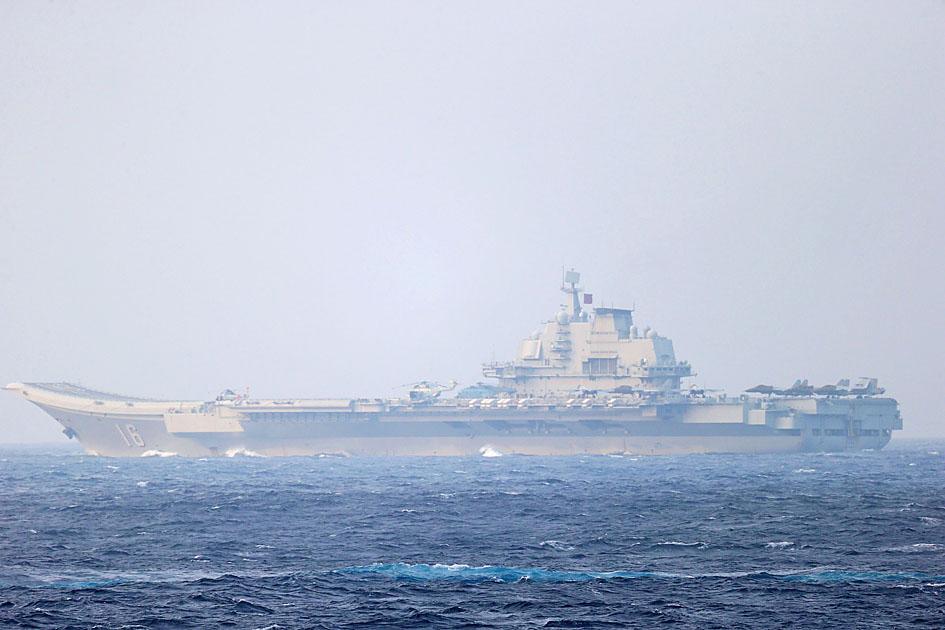The Ministry of National Defense yesterday said it is monitoring Chinese People’s Liberation Army (PLA) Navy ship movements near Taiwan, after the Japanese Ministry of Defense disclosed that Chinese vessels made a rare voyage between Yilan County and Japan’s Yonaguni.
The Japanese ministry on Wednesday said that two Chinese navy ships on Tuesday diverted from their usual route of entering the Pacific Ocean via the Miyako Strait and for the first time traveled there between Yilan and Yonaguni.
The Japan Self-Defense Forces said that it picked up the presence of China’s Type-056A Jiangdao-class corvette 220km north of Yonaguni at 9am on Tuesday.

Photo: Reuters
The vessel met with a Type-052C Luyang II-class destroyer 210km north of the island at 11pm, before together sailing toward the Pacific, it said.
Chinese naval ships usually enter the Pacific through the Miyako Strait — between Japan’s Miyako-jima and Okinawa islands — the Bashi Channel or the Luzon Strait, the latter two of which are between Taiwan and the Philippines.
It is rare for PLA ships to take the route they did on Tuesday, which shows that China is breaking with custom, military observers said.
Meanwhile, two Type 052D Luyang III-class destroyers and two Type 54A Jiangkai II-class guided-missile frigates traveled through the Miyako Strait into the Pacific Ocean, Japan said.
In Taipei, Ministry of National Defense spokesman Major General Sun Li-fang (孫立方) said that Taiwan’s navy closely monitors all Chinese ship movements.
The military is confident, resolved and prepared to safeguard the nation, he added.
The PLA Air Force on Tuesday dispatched 29 jet flights that entered Taiwan’s air defense identification zone (ADIZ), including a Shaanxi Y-9 transport aircraft, a Shaanxi Y-8 transport plane and six Xian H-6 bombers, the ministry said.
The aircraft flew east of Orchid Island (Lanyu, 蘭嶼) and through the ADIZ before returning using the same route.
Compared with previous incursions, this one was a longer-ranged flight, which took the PLA planes closer to Taiwan’s southeastern areas than before, the ministry said.

Taiwan is projected to lose a working-age population of about 6.67 million people in two waves of retirement in the coming years, as the nation confronts accelerating demographic decline and a shortage of younger workers to take their place, the Ministry of the Interior said. Taiwan experienced its largest baby boom between 1958 and 1966, when the population grew by 3.78 million, followed by a second surge of 2.89 million between 1976 and 1982, ministry data showed. In 2023, the first of those baby boom generations — those born in the late 1950s and early 1960s — began to enter retirement, triggering

ECONOMIC BOOST: Should the more than 23 million people eligible for the NT$10,000 handouts spend them the same way as in 2023, GDP could rise 0.5 percent, an official said Universal cash handouts of NT$10,000 (US$330) are to be disbursed late next month at the earliest — including to permanent residents and foreign residents married to Taiwanese — pending legislative approval, the Ministry of Finance said yesterday. The Executive Yuan yesterday approved the Special Act for Strengthening Economic, Social and National Security Resilience in Response to International Circumstances (因應國際情勢強化經濟社會及民生國安韌性特別條例). The NT$550 billion special budget includes NT$236 billion for the cash handouts, plus an additional NT$20 billion set aside as reserve funds, expected to be used to support industries. Handouts might begin one month after the bill is promulgated and would be completed within

The National Development Council (NDC) yesterday unveiled details of new regulations that ease restrictions on foreigners working or living in Taiwan, as part of a bid to attract skilled workers from abroad. The regulations, which could go into effect in the first quarter of next year, stem from amendments to the Act for the Recruitment and Employment of Foreign Professionals (外國專業人才延攬及僱用法) passed by lawmakers on Aug. 29. Students categorized as “overseas compatriots” would be allowed to stay and work in Taiwan in the two years after their graduation without obtaining additional permits, doing away with the evaluation process that is currently required,

IMPORTANT BACKER: China seeks to expel US influence from the Indo-Pacific region and supplant Washington as the global leader, MAC Minister Chiu Chui-cheng said China is preparing for war to seize Taiwan, Mainland Affairs Council (MAC) Minister Chiu Chui-cheng (邱垂正) said in Washington on Friday, warning that Taiwan’s fall would trigger a regional “domino effect” endangering US security. In a speech titled “Maintaining the Peaceful and Stable Status Quo Across the Taiwan Strait is in Line with the Shared Interests of Taiwan and the United States,” Chiu said Taiwan’s strategic importance is “closely tied” to US interests. Geopolitically, Taiwan sits in a “core position” in the first island chain — an arc stretching from Japan, through Taiwan and the Philippines, to Borneo, which is shared by